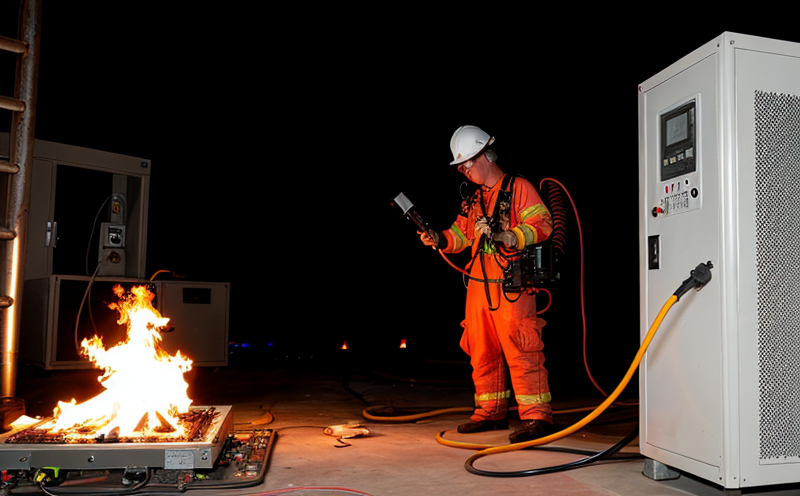Fire Resistance Testing of LED Lighting Components
The fire resistance testing of LED lighting components is a critical aspect of ensuring product safety and compliance with international standards. This process evaluates the ability of an LED component to withstand exposure to flames without igniting, spreading them, or causing excessive heat that could lead to a fire hazard.
LED lighting has become increasingly popular due to its energy efficiency and long lifespan. However, it is essential to ensure that these components can safely be used in various environments, especially where they are in close proximity to flammable materials. Fire resistance testing aims to provide assurance that the product will not contribute to a fire situation when exposed to ignition sources.
The testing process involves subjecting the LED component to controlled flames for a specified duration and observing its behavior under these conditions. The test can be conducted according to various international standards, including but not limited to ISO 834:1967, which specifies the method of determining the resistance to vertical flame spread.
During testing, the sample is placed in a standard fire chamber where it is exposed to an open flame. The duration and intensity of the flame are carefully controlled to simulate real-world conditions. The tester then monitors the behavior of the LED component for signs of ignition or flaming. If any part of the component ignites, the test is terminated immediately.
The primary goal of fire resistance testing is to ensure that the LED component does not become a source of further flame spread. Compliance with relevant standards ensures that products can be used safely in residential and commercial settings without posing a risk of fire or smoke inhalation. This type of testing is particularly important for applications where LEDs are used as a primary light source, such as in recessed ceiling fixtures, under-cabinet lighting, or accent lighting.
Fire resistance testing also helps manufacturers identify potential weaknesses in their designs and materials. By understanding how the LED component responds to fire exposure, engineers can refine their products to meet stringent safety requirements. This process is crucial for maintaining a high level of product quality and reliability.
In addition to flame spread performance, other factors such as heat release rate, smoke production, and structural integrity are also considered during testing. These parameters help ensure that the LED component not only resists ignition but also remains stable under fire conditions, minimizing the risk of further damage or injury.
The results of fire resistance tests can be used to inform product design improvements, improve manufacturing processes, and enhance overall safety standards. By adhering to these testing protocols, manufacturers can ensure that their LED components meet rigorous international standards and provide peace of mind for consumers and regulatory authorities alike.
Applied Standards
| Standard | Description |
|---|---|
| ISO 834:1967 | This standard specifies the method of determining the resistance to vertical flame spread. |
| IEC 60252-22 | International standard for fire performance testing of luminaires and other electrical equipment. |
| UL 863 | Underwriters Laboratories' standard for flame resistance of plastic parts used in electronic apparatus. |
| EN 50274 | This European standard covers the fire performance requirements for luminaires and other electrical equipment. |
The application of these standards ensures that the testing process is consistent, reliable, and meets international quality benchmarks. Compliance with these standards provides manufacturers with confidence in their product's safety and helps ensure regulatory compliance.
Eurolab Advantages
At Eurolab, we provide comprehensive fire resistance testing services specifically tailored to the needs of LED lighting component manufacturers. Our state-of-the-art facilities and experienced personnel ensure that each test is conducted with precision and accuracy.
We use cutting-edge equipment and methodologies to simulate real-world conditions, providing reliable data for product development and quality assurance. Our team of experts can help you interpret test results and offer recommendations for improvement based on our findings.
Our services are designed to meet the highest industry standards, ensuring that your products not only pass regulatory requirements but also exceed customer expectations in terms of safety and performance. With Eurolab's expertise, you can be confident that your LED lighting components will withstand fire exposure without compromising safety or functionality.
Quality and Reliability Assurance
At Eurolab, we take a holistic approach to quality assurance, ensuring that every aspect of the testing process is conducted with the utmost care. Our facilities are equipped with advanced instrumentation and software tools that allow us to perform precise measurements and analyses.
We employ highly skilled technicians who have extensive experience in fire resistance testing. They adhere strictly to international standards and guidelines, ensuring consistent and accurate results. This approach not only enhances the reliability of our test data but also provides manufacturers with valuable insights into potential areas for improvement.
Our commitment to quality extends beyond just the testing process itself. We work closely with clients throughout the product development lifecycle, offering guidance on design modifications that can enhance fire resistance performance. By leveraging our expertise in this area, we help ensure that your products are not only compliant but also exceed industry expectations.





